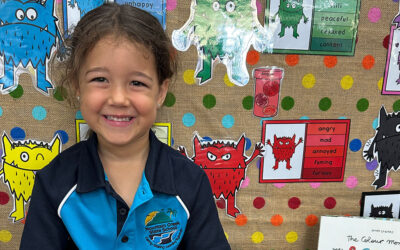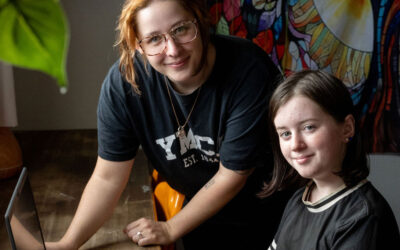The lights are dimmed, there is music playing softly and the class of 20 students are peacefully engrossed in their tasks – it sounds like the setting for a yoga class but it’s not. It’s The Big Write happening in a Year 4 classroom at Matthew Flinders Anglican College on the Sunshine Coast.
With literacy as a major focus at the College’s Primary School, students from Prep to Year 6 are benefitting from a respected model of teaching writing and raising writing standards known as the Big Write.
Developed by experienced educator, Ros Wilson, and used widely in schools throughout the United Kingdom and Australia with great success, the Big Write model is based on the premise that ‘if you can’t say it, you can’t write it’.
Big Write is an opportunity for students to learn how to generate ideas through conversation and fun activities in the classroom and at home, before engaging in independent writing tasks in soothing settings that promote calm and creativity.
Students simultaneously learn skills in VCOP (vocabulary, connectives, openers and punctuation) to support their writing confidence and engagement.
Flinders has embraced the Big Write model this year as part of its mission to give every student the tools and support to develop their literacy skills and become proficient and enthusiastic writers.
Head of Primary School, Trudi Edwards says the College is passionate about literacy and language development.
“We recognise that children must first learn to express their ideas orally before they can confidently write these ideas on the page,” Trudi said.
“Developing an expansive vocabulary through engaging in oral discussions and activities assists in building each student’s word bank, whilst also enabling them to organise their ideas prior to writing,” she said.
“Needless to say, an expansive vocabulary is also critical for reading comprehension.
“In fact, as Associate Professor of Education and the Arts, Deslea Konza from Edith Cowan University notes, the number and variety of words that children know in the early years is a major predictor of reading comprehension in the secondary schooling years and of broader academic and vocational success.
“The Big Write is a positive and practical approach to teaching writing that encourages every child to learn new words, explore the art of conversation and learn to communicate so they may actively develop their ‘writing voice’.
“It helps students of all proficiencies realise that writing is enjoyable and an opportunity to express their creativity, whilst also learning the skills of clear written communication.
“This remains a critical 21st century skill.”
Head of Teaching and Learning Debbie Planck says the Big Write model works by providing students with a new topic to inspire a writing task, every fortnight or so.
To help students engage in their writing, there is plenty of creative stimuli, from themed dress-up days and excursions to Sea Life Aquarium and Australia Zoo, to classroom observation activities such as chicken eggs hatching in an incubator.
“Part of the Big Write is teaching skills in vocabulary, connectives, openers and punctuation, and we play lots of exciting games in the classroom to build on these foundational skills,” Debbie said.
“Students especially love Kung Fu Punctuation, where all punctuation marks are given corresponding kung-fu-style actions with accompanying sounds,” she said.
“This is proving highly effective for students in learning the intricacies of commas, semicolons and full stops while having fun and moving their bodies.”
Each Big Write involves students first discussing the topic with their family at home in preparation for their writing challenge the following day in class.
When students return to the classroom to begin their ‘Big Write’, their thoughts and ideas about the topic are already rehearsed.
“This provides them with the best opportunity to focus on the skills of writing and to write in depth about the topic,” Debbie said.
“The end goal of The Big Write is to encourage students to produce a high standard of writing and to build their writing stamina to write independently for extensive periods of time.
“We remind our students from Prep to Year 6 that the Big Write is an opportunity to set high expectations for themselves, to give writing a purpose, and to have fun.”
Related Reads
Flinders teacher awarded National Excellence in Teaching Award 2023
Design thinking at Flinders is solving problems with heart


